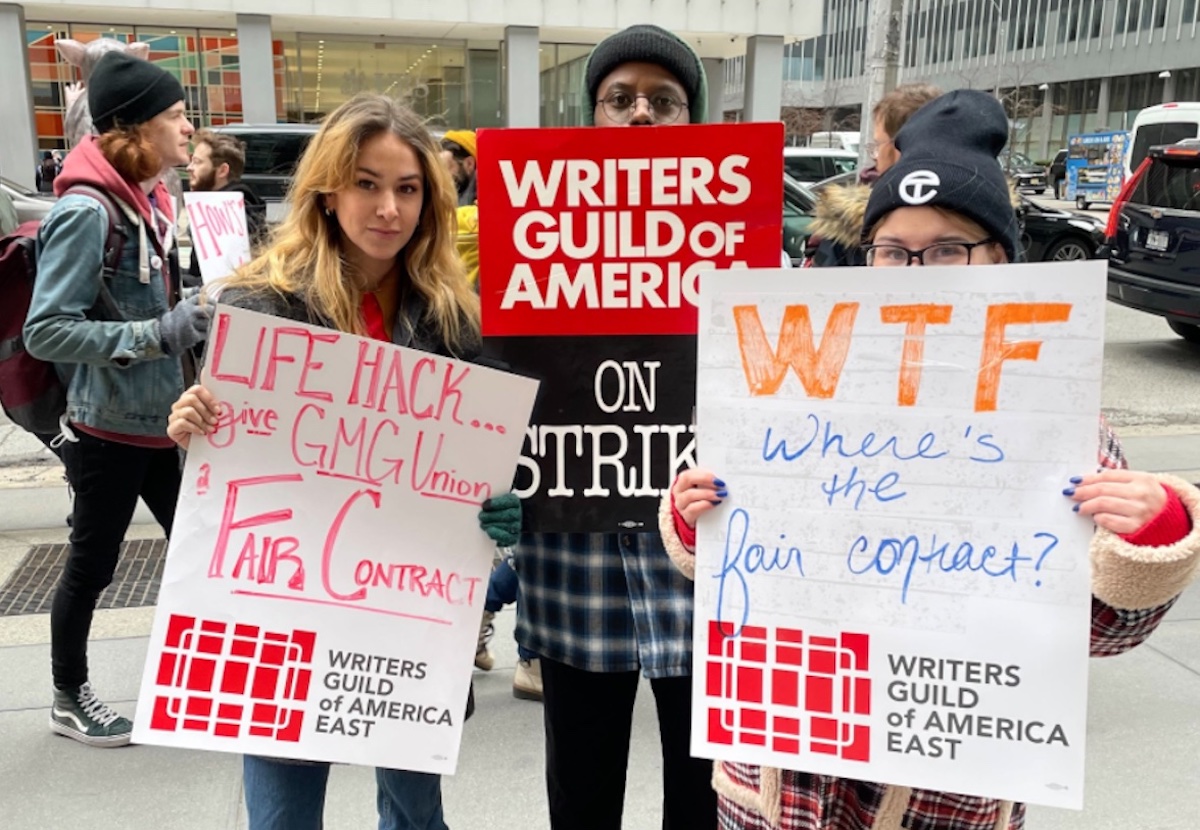Todd Spangler

Members of a union representing about 100 editorial staffers at G/O Media publications — including Jezebel, The Root, Lifehacker, Kotaku, Jalopnik and Gizmodo — have gone on strike after its contract with the company expired Monday at midnight.
Gizmodo Media Group Union, organized with the Writers Guild of America, East, unanimously approved the strike (with 93% of members voting) after the union’s second contract expired Feb. 28. Members of the GMG Union began picketing outside G/O Media’s offices at 1290 Avenue of the Americas in New York City on Tuesday.
In a statement, the GMG Union said, “In 2015, this union broke new ground when it organized the first digital media union. Now, GMG Union will break ground yet again: We are the first digital media shop to go on an open-ended strike for a fair contract.”
The GMG Union said it has been engaged in “good-faith negotiations” with G/O Media since late January. “At every step, G/O Media has slowed down the process with a lack of preparedness and stalling tactics,” it said.
The union is asking G/O Media to maintain its cap on healthcare costs; guarantee minimum wage increases; add trans-inclusive health coverage (compliant with World Professional Association for Transgender Health guidelines); and maintain parental leave benefits. The union comprises roughly 100 reporters, editors, artists, podcasters, social media specialists and videographers.
In a memo sent Tuesday to G/O Media staff, CEO Jim Spanfeller wrote that he was “disappointed we could not come to terms on the current GMG Union contract. We bargained in good faith right up until the deadline late last night when the Union voted to cut off talks and strike.” Spanfeller claimed that the terms G/O Media offered the union were “not only equivalent to, but in some instances better than, terms agreed to by The Onion Union (GMG’s sister union here at G/O) just one year ago.”
“We are struggling to understand why terms agreed to by half the editorial union members last year are not acceptable to the other half now,” Spanfeller wrote in the memo. “Unfortunately, that puts G/O Media in an untenable position with regard to these current negotiations.”
G/O Media was formed in 2019 after Univision sold Gizmodo Media Group and The Onion to private-equity firm Great Hill Partners and Spanfeller, who owns a minority stake in the company. Univision had in 2016 bought several assets of Gawker Media in a bankruptcy auction (which didn’t include Gawker.com, owned by Bustle Digital Group).
With the strike vote, the GMG Union launched a GoFundMe fundraiser to provide support for union members “who will suffer financial duress from this interruption to their normal pay and benefits.” By 3 p.m. ET on March 1, the campaign had raised $32,279 of the $45,000 goal.
The union posted photos of the picket line Tuesday on social media:
Kotaku and Gizmodo Media Group workers strike
Gaming site staff and counterparts from other sites say G/O Media has refused to provide written counterproposals to good-faith bargaining efforts
The Gizmodo Media Group Union went on strike today, with staff at Kotaku, Gizmodo, Jalopnik, Jezebel, Lifehacker, and The Root all halting work and asking people not to visit their sites for the duration of the strike.
The group's existing contract with G/O Media expired last night, and the union identified a number of issues on which it could not come to an agreement with the company for a new contract.
"Since January 31, the Gizmodo Media Group Union (GMG Union) and G/O's Media's outside counsel have met five times," GMG Union said. "Every session, the company's outside counsel sidestepped and delayed, refusing to provide written counterproposals to the union's good-faith proposals. How can you bargain a contract when the people across the table won't even clearly state what they're advocating for?"
The union said G/O Media was refusing to add work-from-home flexibility into the contract or commit to keeping its remote workers remote. (Earlier this year, G/O Media saw almost half of The AV Club staff depart when they were given the choice of relocating to Los Angeles or losing their jobs.)
The union also criticized the company as being unwilling to commit to healthcare standards for trans employees, sufficient parental leave, or diversity hiring initiatives, as well as "lowballing" salaries.
"Kotaku staff is [very] trans, non-binary, and genderqueer," Kotaku editor-in-chief Patricia Hernandez said on Twitter. "I stand with them, and everyone else at G/O Media fighting for better working conditions to make the content that you love."
The union said 93% of its membership participated in a strike authorization vote, and 100% of those voting were in favor of the action. It has also set up a strike fund to support its workers.
G/O Media did not immediately return a request for comment.
Writers from Gizmodo, Jezebel, Kotaku, and More Are On Strike

Workers in the Gizmodo Media Group (GMG) Union, which includes staff writers for Gizmodo, Jezebel, Kotaku, Jalopnik, Lifehacker, and The Root, have announced that they’re on strike after their contract with G/O Media expired Monday night at midnight. The strike includes both a physical and a digital picket line. Workers are asking people not to read or accept freelance work from any of the six websites listed above, and they’re also inviting people to march with them in solidarity outside the G/O Media offices at 1920 Avenue of the Americas in New York City.
Why is the GMG Union Striking?
According to the GMG Union’s website, the union is fighting for six concessions from G/O Media in a new contract: keeping a cap on healthcare costs and offering trans-inclusive healthcare; offering higher salaries to new employees; offering more expansive parental leave; codifying remote work options; making diverse hiring a priority; and avoiding possible forced relocations for workers. The GMG Union claims that G/O Media has met with the union five times but has failed to adequately address the union’s concerns.
“Every session,” the Union says in a statement, “the company’s outside counsel sidestepped and delayed, refusing to provide written counterproposals to the union’s good-faith proposals. How can you bargain a contract when the people across the table won’t even clearly state what they’re advocating for?”
GMG has been embroiled in ongoing labor disputes with G/O Media ever since they were acquired by Great Hill Partners in 2019 and Jim Spanfeller, who is allegedly a herb, was hired to oversee the company.
The NewsGuild of New York, which represents over 3,000 journalists in New York City, has released a solidarity statement, writing that “when Management slow-walks negotiations, as they are with GMG Union, it is an effort to weaken worker power. Management is relying on standard anti-union stalling tactics in a misguided attempt to sap the strength and determination of union members who are fighting for a strong collective bargaining agreement.” (GMG Media writers are members of the Writers Guild of America, East.)
According to Variety, G/O Media claims that it “bargained in good faith right up until the deadline late last night when the Union voted to cut off talks and strike.”
How Can You Help?
If you’re in New York City, you can join the picket line at 1920 Avenue of the Americas. You can also avoid clicking on any links that lead to Gizmodo, Jezebel, Kotaku, Jalopnik, Lifehacker, or The Root.
If you’re able to donate some money, the GMG Union has set up a GoFundMe to help out workers whose paychecks and health benefits will take a hit because of the strike. You can also buy merch, send a letter of support to Great Hill Partners, the equity firm that owns G/O Media, or spread the word on social media.
(image: GMG Media/WGA East via Twitter)
Journalists at Gizmodo and related websites go on strike.
The contract between about 100 workers at six publications and G/O Media expired on Monday night.
By Katie Robertson
March 1, 2022
Journalists from G/O Media publications including Gizmodo and Jezebel went on strike on Tuesday and protested in front of the company’s New York offices after contract negotiations fell apart.
GMG Union, which represents about 100 workers from Gizmodo, Jalopnik, Jezebel, Kotaku, Lifehacker and The Root, said on Twitter that it was asking people not to read content from or contribute to the publications.
The workers are doing an open-ended strike after their contract expired on Monday night. The two sides were unable to come to an agreement on a variety of issues, including pay raises and health care benefits.
GMG Union, which is affiliated with the Writers Guild of America, East, said in a statement that all of the workers it represents had voted in favor of a strike after bargaining with G/O Media since late January. The union is asking for the company to maintain its cap on health care costs, add trans-inclusive health coverage and guarantee minimum wage increases.
Lisa Marie Segarra, a member of the GMG Union bargaining committee and an editor at Kotaku, said striking workers were now locked out of the company’s Slack messaging platform and their email accounts.
“The whole reason we’re going on strike is many of us are underpaid, and a strike doesn’t really help with that but we’re fighting to get the things we deserve,” Ms. Segarra said.
G/O Media was formed in 2019 by Great Hill Partners, a private equity firm, after it bought a group of websites that used to be part of the Gawker Media universe. In an email to the staff on Tuesday that was provided by a G/O Media spokesman, the chief executive, Jim Spanfeller, said management had “bargained in good faith right up until the deadline last night.”
“To be clear, the terms we offered the GMG Union were not only equivalent to, but in some instances better than, terms agreed to by The Onion Union (GMG’s sister union here at G/O) just one year ago,” Mr. Spanfeller said.
The G/O Media spokesman said that the company’s compensation was “extremely favorable when compared to other digital publishers.” He added that the company had proposed health care coverage that was equal to that of nonunion workers.
Katie Robertson is a media reporter. She previously worked as an editor and reporter at Bloomberg and News Corporation Australia. Email: katie.robertson@nytimes.com @katie_robertson







/https://www.thestar.com/content/dam/thestar/news/world/2022/03/01/the-american-right-sees-canada-as-an-enemy-should-we-be-worried/biden_trudeau.jpg)